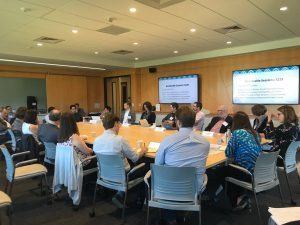Civic Data Privacy Leaders Convene at MetroLab Annual Summit
By Kelsey Finch, FPF Senior Counsel
The MetroLab Network’s Annual Summit brought together an inspired group of civic, academic, industry, and nonprofit leaders to discuss the most important issues in smart cities and civic innovation. For the third year in a row, FPF partnered with MetroLab Network to promote data privacy perspectives and to advance responsible data practices within smart and connected communities.
This year at the Summit, I moderated a roundtable discussion of privacy officials representing Pittsburgh, Seattle, Boulder, and more than a dozen other cities who have joined the Civic Data Privacy Leaders Network, an FPF-led initiative supported by the National Science Foundation. Network members joined summit participants from academia, industry, and civil society to share their most pressing questions, concerns, and smart city success stories with each other. The roundtable highlighted the common privacy challenges and opportunities faced by today’s local government privacy leaders and sparked new ideas for promoting fair and transparent data practices.
In this candid and collaborative atmosphere, some common priorities emerged:
- engaging and activating key stakeholders (including elected leaders, partner organizations, and diverse community members);
- securing adequate resources and strengthening in-house privacy expertise;
- increasing municipal access to cutting-edge privacy enhancing technologies like differential privacy or synthetic data;
- integrating privacy considerations at each stage of the data and technology lifecycle (including procurement);
- committing to clear, consistent privacy principles that reflect community values and priorities.
FPF also previewed a working draft of its forthcoming Smart Cities & Communities Privacy Risk Assessment at the roundtable, intended to help smart and connected communities ask the right questions and reach for the right tools to ensure that they are collecting, using, and sharing personal data responsibly.
Other important, data-centric discussions during the event included Thursday’s Mobility Data Management, Analytics, and Privacy session—in which Network member Ginger Ambruster of Seattle and I participated—and sessions dedicated to a new Model Data Handling Policy for Cities from UMKC, data equity and responsible data science, micromobility services, and digital equity and community engagement. Univision ran a Spanish language story on the event focused on how smart cities can ensure equitable treatment and access to resources for immigrants, which you can view here.
While the Civic Data Privacy Leaders roundtable—and the MetroLab Summit as a whole—underlined the significant challenges that communities around the world are facing as they explore new technologies and data uses, it also highlighted the potential for civic innovation to deliver more livable, equitable, and sustainable communities. By working together across sectoral and geographic boundaries, the event showcased how we can help city and community leaders strengthen their ability to collect, use, and share data in a responsible manner and promote the public’s trust in smart city technologies and in local government.
To learn more or join the Civic Data Privacy Leaders Network, a peer group for local government privacy leaders from more than 25 localities in the U.S. and abroad, please contact me at [email protected].



